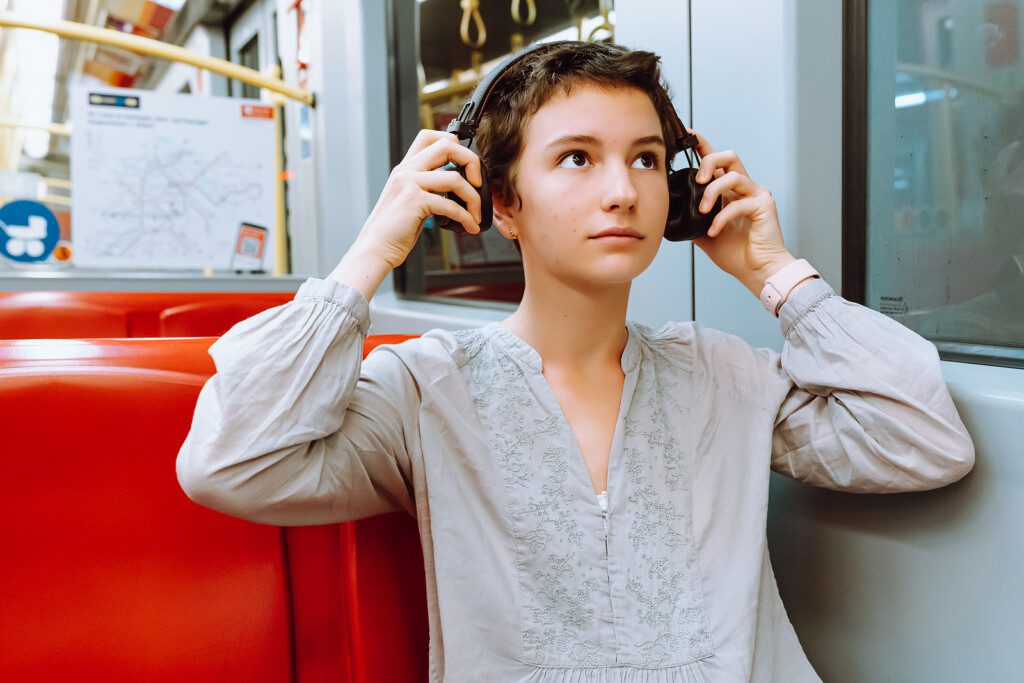Noise-cancelling headphones serve the purpose of blocking out unwanted external noise by monitoring the sounds around you and preventing them from reaching your ears. These headphones are equipped with miniature microphones in the earcups or earbuds that detect external noise frequencies. They then emit an exact opposite signal, effectively “cancelling out” both sets of sounds when their soundwaves collide.

Four benefits of noise-cancelling headphones
Improved focus and concentration
The primary advantage of noise-cancelling headphones is their ability to block out external distractions. This feature can be particularly beneficial for people with autism or Sensory Processing Disorder (SPD) who may struggle with noise and other external stimuli. By blocking out these distractions, noise-cancelling headphones help maintain focus, improve concentration and performance. They can provide a quieter and more peaceful environment, and enhance performance in various tasks.
Reduced stress and anxiety
Surrounded by distractions and external noises, some people may feel overwhelmed and anxious, which can negatively impact their wellbeing. Noise-cancelling headphones create a sense of calm and quiet, alleviating these negative feelings and reducing stress levels. This promotes better performance and enables users to concentrate on their work and retain information effectively, leading to improved mental wellbeing.
Increased learning retention
Noise-cancelling headphones may significantly affect students’ ability to learn and retain information, resulting in better academic performance. Studies have shown that students using noise-cancelling headphones have improved information recall. By enabling students to focus on the teacher’s voice and block out other distractions, these headphones enhance their ability to retain information, facilitating a more effective learning experience.
Accommodation for learning differences
For students with learning differences like autism, noise-cancelling headphones can be a valuable tool. These students may be more sensitive to external stimuli, making it challenging to concentrate in a traditional classroom setting due to distractions. Research indicates that noise-cancelling headphones significantly improve the attention of students with ADHD, and students with autism achieve better test scores while experiencing reduced stress and anxiety. Noise-cancelling headphones promote a more inclusive and supportive learning environment, accommodating students with diverse learning styles and needs.
How can headphones help people with Autism
Headphones are beneficial to autistic individuals in several ways:
1. Sensory overwhelm
People with autism and SPD often experience sensory overwhelm as part of their daily lives, including sound sensitivities. Wearing headphones can reduce overwhelming auditory sensory input to a more comfortable level, leading to a significant reduction in the fight-or-flight response and a calmer state of mind.
2. Increase alertness levels
Individuals with Autism may also be sensory-seeking and prefer to lessen background noise by listening to specific sounds. Strategically using headphones with music can increase alertness and stimulate the release of dopamine, which boosts mental and physical energy. Playing music serves as an effective self-regulatory strategy for anyone.
3. Emotional regulation
Noise-cancelling headphones can block out noise and aid in calming down after a stressful experience. By reducing sensory load, they provide stress relief and contribute to emotional regulation.
4. Support focus
Headphones can also improve focus, especially for individuals with auditory processing disorders. By reducing auditory distractions, headphones help individuals cope with challenging situations and stay focused on conversations or relevant sounds, facilitating more meaningful interactions and connections in social settings.
5. Social inclusion
Headphones enable autistic individuals to participate in environments they would typically find intolerable. They promote inclusion, social skills, and connection.
Research suggests that headphones can reduce anxiety levels and improve communication skills in autistic individuals, potentially providing more opportunities for social engagement and active participation in communities.
Headphones are a valuable tool for people with learning differences, helping them block out overwhelming noise and sensory stimuli, promoting calm and focus. It’s important to note that headphones can also serve as a beneficial regulatory tool for individuals of all backgrounds and needs, facilitating a more controlled and focused environment for everyone.





